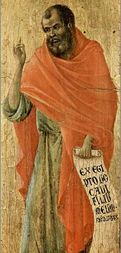 Of all the prophets, the one with the most heart-wrenching and poignant personal story is Hosea. Unlike all but one other prophet, (Jeremiah), his life and his emotions were a completely open book. He bravely laid it all bare in order to highlight the great love God has for His people, a people who had betrayed Him. The parallels Hosea drew with his own life meant that he had to become totally transparent in order to serve God and to get the message to the nation that God did not want to punish them so much as to bring them back to His love. In reading the prophecy of Hosea it is important to keep in mind that it is not about God getting some sort of perverse pleasure out of ‘smiting’ the people for their sins, but that it is the exact opposite: because He loved them, God sent the prophet to warn the people that in turning from Him they were choosing destruction. Thus, God chose Hosea to announce His message, a role which meant that Hosea’s life would become totally public: nothing about him would remain hidden. Faithfully Hosea accepted God’s call to prophesy in this total transparency, taking on the ministry as a loving response to God.  The Book of Hosea begins with God telling Hosea to marry Gomer, a woman God described as a harlot. One would think he only married Gomer out of duty to God, but surprisingly, he actually fell in love with her. This is evident in how he reacted when she ultimately abandoned him after she bore their third child: his heart was truly broken and the pain cut him to the core. Furthermore, because she ran off with another man, Mosaic Law allowed Hosea to easily divorce her and be done with the entire situation. But he did not. Despite the fact that everyone around him knew she had betrayed him, he openly professed how broken his heart was, begged her to return multiple times, and then forgave her when she finally did. (This ‘cycle’ happened more than once!) None of that is the sign of a man trapped in an arranged marriage. There is no doubt that he loved her deeply and truly wanted her back.  Hosea’s marriage became the metaphor he used in his prophecy. God inspired him to understand that when the people of Israel were ‘running off’ from Him through their pagan practices and selfish behaviors, God's feelings were similar to his.* Hosea made it clear that God did not want to lose them to their enemies, the Assyrians, who were looming on the borders of the nation, waiting to swoop down on the people made vulnerable by pushing Him away. In all that happened, Hosea chose to remain totally visible and transparent, letting the entire gamut of his emotions be seen as he put himself aside and channeled his love, his anger, and ultimately his sense of mercy, into speaking the message of God. Hosea, therefore, addressed Israel’s ‘harlotry,’ which refers to their adoption of pagan attitudes and behaviors. Their most serious crimes were idolatry and egregious abuse and oppression of the poor. The affluent literally withheld their aid from the poor, the alien, the widow, and the orphan in order to fuel their own hedonistic lifestyles. They worshipped in the temples to false gods, often participating in immoral activities such as pagan rituals that included male and female prostitutes, and worst of all, sometimes they immolated their first born children as offerings. In business they were often corrupt, and those with power abused it. However, we must remember that there was also a small segment of the population who were horrified at this and who remained faithful, despite those who were breaking the covenant with seemingly no fear of consequences. 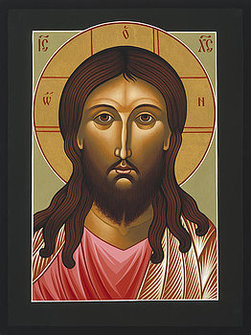 Although many passages in the Book of Hosea seem filled with God’s anger, these statements arose not because He was a spurned, jealous lover, but rather that in His immense love He feared for His people. In contrast to the challenging words, there are also passages in which Hosea described God as both a loving father and a faithful spouse, sometimes speaking quite tenderly, such as when He says, “I will allure her… speak to her heart.” (Hosea 2:16) God wanted the people to return to Him through love, not threats, so even though He had Hosea outline in great detail what could happen to them, more than anything He desired to restore the relationship of love: “I will espouse you to me forever…in love and in mercy.”(2:21) The bottom line is that no matter what they did, God wanted to be merciful with them and He wanted to shower them with blessing and the spiritual prosperity which came with being His children. But God also made it clear that what He wanted was not empty ritual or for them to go through the motions to satisfy obligation, but rather He desires sincere relationship. He said: “For it is love that I desire, not sacrifice, and knowledge of God, not holocausts.” (Hosea 6:6)  With the growing number of the so-called ‘nones’ (those who espouse no religious affiliation) in our present age, and with some people claiming to be ‘spiritual, but not religious,’ it is not a huge stretch to see echoes of the words of warning found in the prophecy of Hosea. We should be disturbed by the growing number of those who have grown up with a faith community and then have opted out of religious practice. Their reasons are many, however, although perhaps some contributing factors are that some leaders have abused their authority and that our witness is simply not that strong; in our culture many are apathetic in living the faith, thus communicating that it is somehow unimportant or optional. But whatever their reasons, when people leave their community of faith, even if they still claim to be ‘spiritual,’ quite often the lack of accountability and the lack of exposure to worship and expressions of faith lead to apathy in prayer and finally to a loss of relationship with God. Outside of a faith community, our practices will erode, and so will our relationship with God: if there is nothing to feed it, faith will wither. However, if we want to change these attitudes, if we want to push against this exodus from churches, we have to live our own faith with purpose. That is, we must be prophetic, like Hosea, and live what we believe, giving witness to the goodness of God expressed through His faithful people. 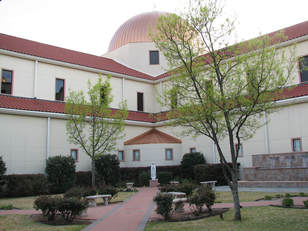 Happily, the Book of Hosea ends on a resounding note of hope. Hosea urges the people to return to God saying that He will “forgive all iniquity and receive what is good.” (Hosea 14:3) God also says He “will love them freely” and that He “will be like the dew of Israel,” (Hosea 14:5-6) healing them and helping them prosper. The same is true today: God desires that His ‘runaway’ children would return to Him so that we would allow Him the honor of blessing and loving us! I suggest reading the Book of Hosea with our own times in mind. It is important to understand the prophets in order to have extra clarity not only about who God has always been, but because they also shed light on the words of Jesus in the gospels. Reading the prophets, particularly Hosea, can also inspire the faithful to live transparently; this means to live with our faith showing, not hidden. The point is not to be obnoxious or to fall into prideful behaviors, but rather it is to live humbly, with love and mercy, and to allow others to see us as we are: sinners who are loved deeply by God. 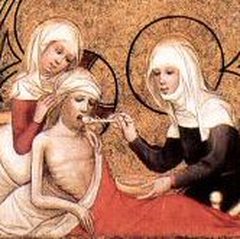 It is our witness in living the gospel that will present our faith as authentic. As God said, it is love He desires, which means a certain humility in our actions; therefore it is not our piety which we need to wear openly, but it is our sincerity in living the values Jesus taught, (loving our neighbors as ourselves, giving generously to the poor, serving humbly), that will touch hearts to return to God. If we present God as love and mercy, and witness to the value of the Christian community, people will become interested in what it is we profess. But we must actively work at it by participating in our churches, which are our faith families, and we need to speak up if there is healing which needs to be done. In short, if we want to live as saints, if we want to show others the way to the Lord, then we must be active and we must be transparent. Jesus said, “Do not hide your light under a bushel basket, but let your light shine so that others may see it.” (Paraphrase of Matthew 5: 15-16) Shining our light is living as transparently as Hosea lived. Let us, like him, be true to our call in response to love and mercy.  May we be inspired by the challenging, yet hope-filled words of Hosea the prophet! May we come to know the merciful love and mercy of God so that we might share it with others! May we be courageous in living our faith with transparency and sincerity! May we recognize that our actions, even the smallest ones, can make a difference in the life of another if we do them with great love! And may we let our light shine as we work at living the gospel values taught by Jesus, building the Kingdom of God through sincerity and love! Let us continue to meet in the Heart of Jesus! Peace! © Michele L. Catanese * Remember, the writer is personifying God because there is no other way to communicate the depth of God’s love. The truth of the matter is that our sin ‘hurts’ God because He loves us. It does not diminish God, but it diminishes our relationship with Him. Note: Next post, Sunday, September 9. Images: 1. This painting of the prophet Hosea was done by Duccio di Buoninsegna (1308-11). It is located in the Siena Cathedral in Siena, Italy. 2. All the photos in this post are mine; the one here is a sunset over the Badlands of North Dakota. I chose it to symbolize Gomer and her lover heading for the hills, leaving Hosea behind. I wanted a beautiful picture, however, to remind us that Hosea remained in love with her and considered their covenant binding no matter what she did. 3. I took this picture in South Dakota and chose to use it because the exterior of the tree looked healthy, yet it was rotted on the inside, seemingly the cause of its fall. It seems that Israel was suffering from a similar ailment during the time of Hosea: they thought they were healthy and appeared to be so, but they were rotting on the inside and were destined to fall. 4. This icon by Fr. William Hart McNichols is called Jesus Christ Holy Forgiveness. It seemed appropriate to place it here because God was continually telling the people that He loved them and wanted to draw them back with cords of love. One could say that when Jesus hung on the Cross He was "bound" by love and tremendous forgiveness for the sins of the world. You can find this icon at http://frbillmcnichols-sacredimages.com/featured/jesus-christ-holy-forgiveness-040-william-hart-mcnichols.html. 5. I took this photo while hiking on Copper Mountain in Copper, Colorado, a few years ago. It seems to offer an easier path, but the lure of that which is easier is often a deceptive one. Cultivating a faith life and living as a prophetic witness takes a bit of work and is far from the easy road, but it is worth the effort since the goal is God. 6. This is a Catholic Church outside of Dallas, Texas. I wanted a representation of a community of faith as a reminder of the importance of fellowship and as an example of living as disciples. 7. This painting depicts the Corporal Works of Mercy outlined in Matthew 25. I chose to use it here because it is a beautiful example of how to make our faith visible through humble service. 8. I took this photo in the Boston Gardens. I chose it for the end of the post because of the reflection of the trees on the water as a symbol of us mirroring the love of God. I also liked the two people on the bench in the left corner as a sign of community. NOTE: In compliance with GDPR rules, I wish to make it clear that I do not gather any information on any of my readers at any time. 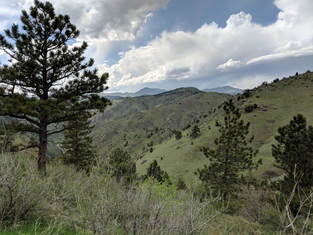 When people think about holiness quite often the first qualities which come to mind are love and humility. In contrast, when we think about ‘worldliness’ we might recognize the overriding characteristics of self-centeredness and ego-driven hubris, which we refer to spiritually as pride. As mentioned in a previous post, the humble ones are not meek wallflowers or doormats, but on the contrary, they are actually bold. They know God comes first rather than self and they embrace the call to live by Gospel values, empowered by God’s love and the desire to share that love. The humble are aware that it is not about the power of their prayer, but that it is about the goodness of the One who hears the prayer; they know that it is not about the size of their efforts, but that it is about an offering of love; they know it is not about their gifts, but that it is about God’s magnanimity. On the other hand, the prideful, even if well-intentioned, think that it is about the power of their prayer, and then act as if they are the source of all that is good; it is as if they believe that if it were not for them, progress would not be made, and often they seek accolades and attention to be paid to them in return. In truth, those who put themselves at the center will not be able to sustain their efforts even if they are ‘armed’ with all sorts of giftedness, for as the Scripture says, “Pride goes before a fall.” (Paraphrase of Proverbs 16:18)* Interestingly, the holy ones are also empowered, but rather than with ego driven acts, they go forth armed with nothing but humility and love. 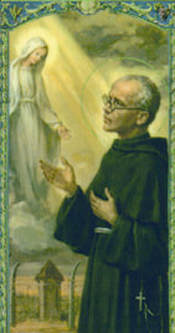 An excellent example of someone who was armed with nothing but humility and love is St. Maximilian Kolbe. (Feast day, August 14) Many of us know about how he sacrificed himself for another prisoner while he was incarcerated at Auschwitz, but fewer are aware that he began a Militia which grew to include thousands. This was an organization of prayerful people equipped not with guns, but with love and humility. The “Militia Immaculata” was (and still is) an army of those dedicated to Mary as the Immaculate Conception, whose work is to lead everyone to her son, Jesus. (St. Maximilian called it a Militia, hence I have chosen to use the term “armed.”) Briefly, St. Maximilian was born Raymond Kolbe to working class parents in Zduńska-Wola, Poland, in 1894. One day when he was 12, he did something which displeased his mother who ‘lamented’ as to what might become of him, a comment which he found so troubling that he prayed to Mary for help, asking the same question. Mary appeared to him that night offering him two crowns, one white (for purity) and one red (for martyrdom) asking him which one he preferred. Kolbe said he would take them both. In 1910 he entered the Conventual Franciscans, taking the name Maximilian Mary and was ordained in 1918. A year before his ordination, he began the Militia Immaculata along with 6 other seminarians with the goal to “sanctify as many souls as possible under the patronage of the Blessed Virgin Mary.”** 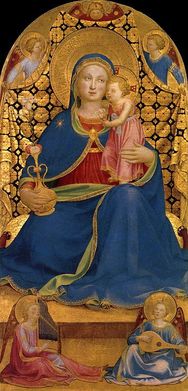 Maximilian consecrated himself to Mary as the Immaculate Conception, (the Immaculata), and drew others into the Militia to do the same. In imitation of Mary’s humility, and in true love for her and for Jesus, St. Maximilian devoted his life to promoting the Militia. Although he suffered from poor health and was even in a sanitarium suffering from tuberculosis for a few years, he founded what was called the City of the Immaculate, (Niepokalanów, in Polish) which was an organization devoted to the usage of mass media for all those who wanted to help spread the faith under the patronage of the Immaculata. The group eventually numbered in the thousands. They were devoted to prayer, poverty, and charity, as well as to publishing materials, specifically a daily newspaper and a monthly magazine called Knight of the Immaculate, in order to teach people about the gospel and to promote Marian devotion. Kolbe thought of himself as a missionary and as such he also founded “cities” (monasteries) in India and Japan. His publications eventually ran him afoul of the Nazis and he was arrested in Poland and sent to Auschwitz. During his time in Auschwitz, he was known for bringing hope and fostering faith among the prisoners until the event for which he is most known: he offered his life in order to spare a married man with a family who had been chosen for death by the Nazis in retaliation for an escaped prisoner. Kolbe laid down his life for another, dying a horrific death on August 14, 1941. 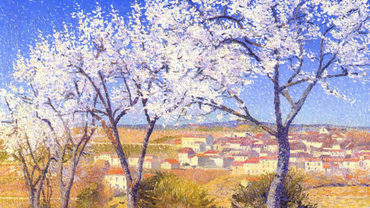 We learn from St. Maximilian, who imitated Jesus and Mary, that humility and love are the best weapons we have in our spiritual arsenal when we do battle with that which stands against God. Thus when I say we must “be armed with nothing but humility and love” it means that as disciples of Jesus we do not take anything into our spiritual battle which might tear down, but only that which builds up: Jesus continually taught that humility and love build up. And we truly are engaged in spiritual warfare every day of our lives. The devil tries to deceive us at every turn and he especially wants us to become prideful so that we stray from our path to holiness; he wants us to think that we can go it alone without needing to call upon God for help. And the devil fears Mary because her humility is the exact opposite of what he wants for us. It is the purity of her heart, observed through her humble, but profound service of the Lord, which connects her to God and saves many souls on His behalf. If we reach out to others in humble service, then, we are indeed following the way of the Immaculata, taught in word and deed by St. Maximilian. His willingness to die for another speaks of selflessness in the face of self-preservation, and it gives witness to the peace within his own soul because he had indeed accepted both crowns offered him by Mary. Certainly the humility and love with which he was armed, buoyed by the prayers of the Militia, were the graces which enabled him to endure the suffering.  With Mary as his inspiration, Maximilian stressed the virtue of humility when he taught seminarians. He put great emphasis on saying that the way to become holy is to accept God’s will as our own, an act of humility. Upon reflection, it makes sense to understand this in light of Jesus’ teaching that there is “no greater love than to lay down one’s life for one’s friends.” (John 15:13) Therefore, every time we join our will to God’s, we are truly ‘laying down our life for a friend,' since God is our ultimate and truest Friend. Laying down our will is the greatest gift we can give Him because in doing so we are acknowledging that although we may not understand His will, we trust His wisdom and love. Further, laying down our life does not mean we have to literally die, but it means we die to self, becoming less self-centered and therefore more humble, loving, and holy. Although he did give his life, Maximilian teaches us that the greater giving is to put God in the center so that we might truly serve our brothers and sisters, knowing that we are not better than they are, but attempting to live in true solidarity; that is, recognizing and believing that we are all of equal dignity and worth in God’s eyes. 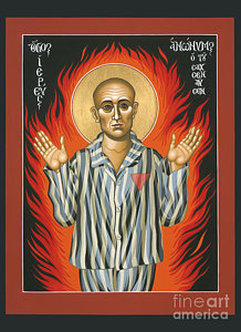 We can imitate St. Maximilian by living our lives ‘armed with nothing but humility and love’ as we seek to work against anything in ourselves which moves us away from God such as complacency, consumerism, materialism, prejudice, fear, neglect of the poor, the spreading of lies and gossip, and the ‘me-first’ attitude prevalent in our culture. Only then we can begin the work against the sin of pride exteriorly by teaching humility through our example to those who preach ideologies which bring hatred and division, to those who misuse or waste our resources through selfishness, and to those who adhere to regimes which seek to conquer by violence, separatism, elitism, and philosophies that have no room in them for God. If we dedicate ourselves to prayer, also asking Mary and the saints for their intercession, and if we study Scripture seeking to grow in gospel values, (especially those of love and humility), we can make a difference in bringing others to God. All it takes are small deeds done with great love. And if we are armed with nothing but humility and love, shining a light upon Jesus rather than upon ourselves, we can be as St. Maximilian, ultimately victorious in his total imitation of Christ, our Lord.  May we be courageous enough to ask for the gift of humility, that we might imitate Mary, the Immaculata! May we seek the intercession of St. Maximilian Kolbe to learn how to be armed with nothing but humility and love! May we be willing to join our will to God’s so that we might truly grow in holiness and offer this as a gift to Him! May we be fitting examples of humble service, just as Jesus instructed the disciples in the Gospels! And may our works of mercy and compassion bring others to God, so that we might build up and not tear down! Let us continue to meet in the Heart of Jesus! Peace! © Michele L. Catanese * In the New American Bible Revised Edition the verse reads like this: “Pride goes before disaster, and a haughty spirit before a fall.” (Proverbs 16:18) ** The information, as well as the quote used, is from https://saintmaximiliankolbe.com/biography/ I also used this site which has is a good short video. (Caveat: it ends with an advertisement for jewelry.) https://catholic.org/saints/saint.php?saint_id=370 Note: Next post on August 27. Images: 1. This is one of my photos, taken in Colorado, just south of Kremmling. I chose to use this for the opening of this entry because I think it seems 'easy' to feel humble when one is surrounded by the beauty of nature, especially in the mountains. 2. This is a painting of St. Maximilian Kolbe which shows him in prayer, seeming to be asking the intercession of the Immaculata, the Blessed Virgin Mary. Near the bottom is a representation of the concentration camp at Auschwitz with the watchtower and a barbed wire fence. I chose this painting because it contains all the important symbols which represent the life of St. Maximilian. My favorite part of this is that Mary and Maximilian dwarf the concentration camp, and that is as it should be. His humility, love, and faith are far more important than the mode of his death. This image is found on the page with the video mentioned above after the second footnote. ** 3. This painting by Blessed Fra Angelico is called The Virgin of Humility. (Circa 1433-35) I love the work of Fra Angelico, and though it depicts Mary in Heaven, there is no doubt as to the purity of her soul and thus, her closeness to God to whom she intercedes for us. https://museothyssen.org/en/collection/artists/angelico-fra-fra-giovanni-da-fiesole/virgin-humility. 4. Called Flowering Almond Trees, Cailhau, this painting by Achille Lauge (1909) is a beautifully fitting image for this paragraph. First of all, there is a town in the background, a sign of building up. But also the almond trees reminded me of the prophecy of Jeremiah in the Old Testament. (Jeremiah 1:11-13) Jeremiah had just heard and accepted the call to be a prophet and God showed him an almond tree, referred to as 'the watching tree' because it bloomed in late winter and thus it was a sign that spring was coming. That connection made me think of the new life of spring and also that God is indeed watching out for His people. You can find it and a bit of information at https://widewalls.ch/artist/achille-lauge/. 5. I took this close up of a pelican a few years ago, and thought it worked here because mother pelicans are known for sacrificing themselves for their young. If they cannot find food, they offer their own blood so that their chicks will survive. 6. This is an icon by Fr. William Hart McNichols called Holy Priest Anonymous One of Sachsenhausen. I chose to use this icon instead of another image of St. Maximilian because there were many priests who also died at the hands of evil regimes. That is not to say that we ever forget the countless others, but rather, it is keeping with all those who have laid down their lives for their faith, for their friends, and for their countries. You can find this at http://frbillmcnichols-sacredimages.com/featured/holy-priest-anonymous-one-of-sachsenhausen-013-william-hart-mcnichols.html. 7. Finally another of my photos, this one taken at Lost Maples State Natural Area in Vanderpool, TX. I chose to use it here in order to end with an image of beauty and of hope. NOTE: In compliance with GDPR rules, I wish to make it clear that I do not gather any information on any of my readers at any time. |
Heart Speaks to Heart
|

 RSS Feed
RSS Feed

